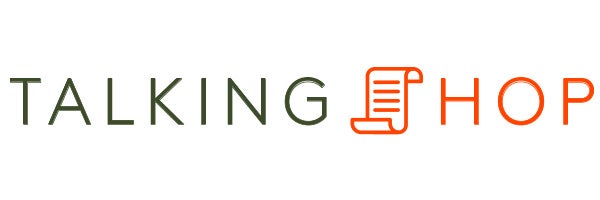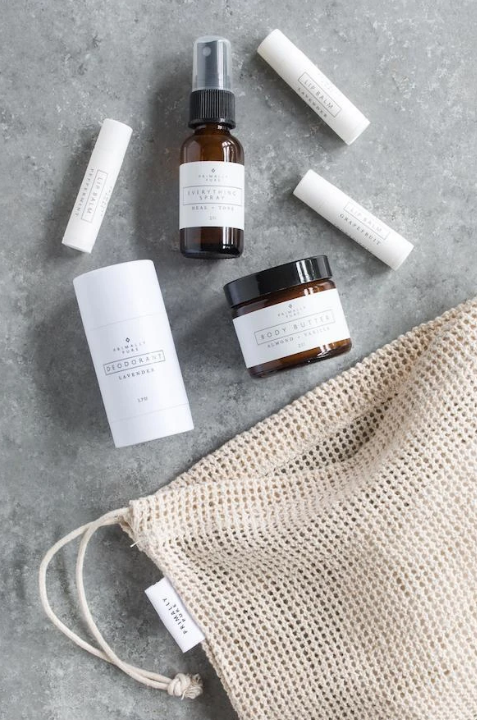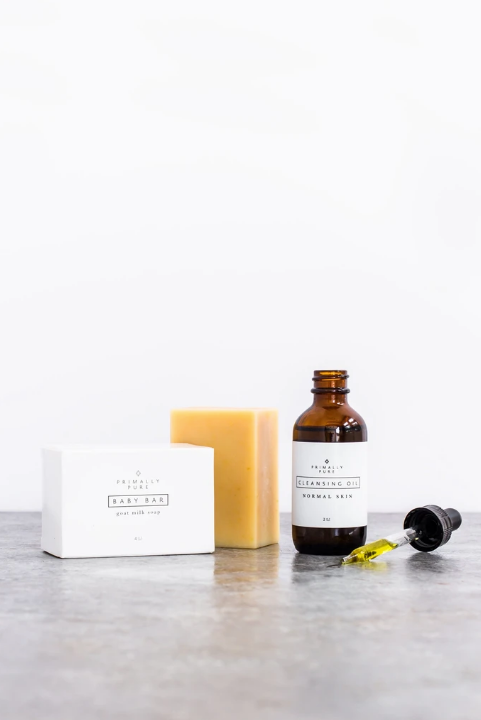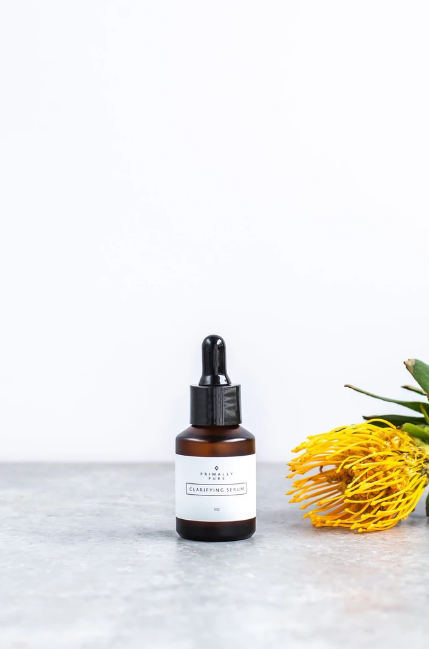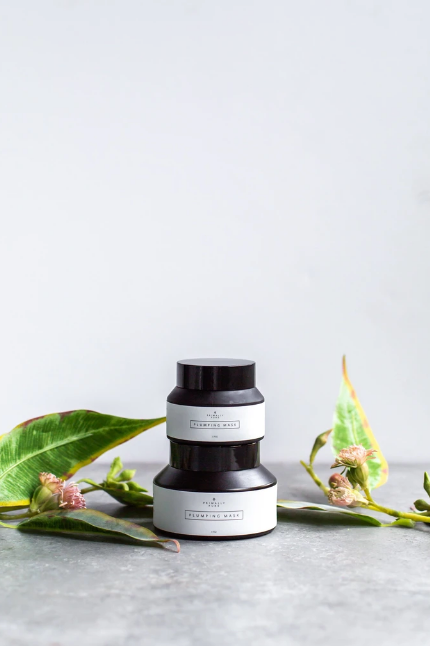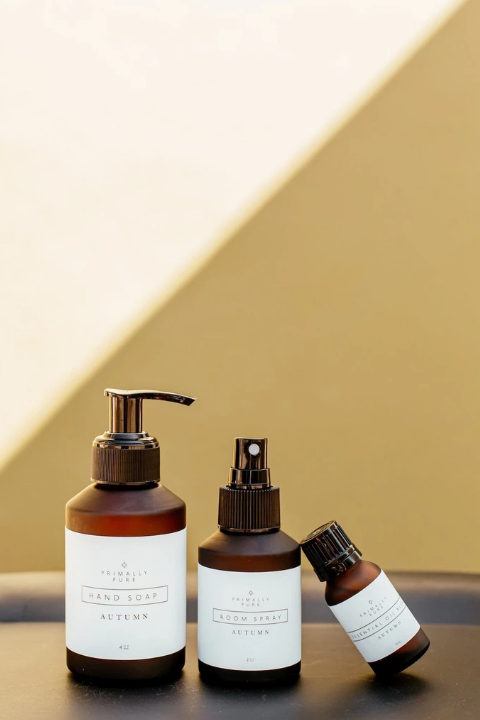How Primally Pure’s Founder Turned Her Hobby Into A Booming Skincare Business
Courtesy of Primally Pure
When we're teenagers, we usually want nothing more than to blend in. Sadly, our skin often has other plans. Pimples played a prominent role in so many of our teenage experiences, but not everyone uses their time spent worrying about zits as inspiration for a career. Bethany McDaniel, founder of Southern California-based natural skincare brand Primally Pure, however, did exactly that.
As a teenager, McDaniel struggled with acne and skin sensitivity. She turned to medications and creams that only seemed to make things worse. So she started doing her own research and learned that there were problematic ingredients in many skincare formulas. This discovery led her on a journey of mixing her own formulas. In 2013, McDaniels started a business selling these products — made from only raw ingredients — through her family's livestock farm, Primal Pastures. Now, Primally Pure has its own direct-to-consumer site where it sells a variety of non-toxic solutions for the home and body, ranging from aromatherapy oils and wellness tools to deodorants and serums. It also has a namesake spa alongside its headquarters in Murrieta, California.
AdvertisementADVERTISEMENT
In this edition of Talking Shop, McDaniel shares the life event that pushed her to take the leap and transform her natural skincare mixing hobby into a real business. She also explains what her former job at Trader Joe's taught her about working with customers and her mission to transform the way people think about skincare.
Courtesy of Primally Pure
Refinery29: Walk me through the process of launching Primally Pure.
Bethany McDaniel: I kind of launched Primally Pure by accident. I was never expecting to build a successful brand when I started out. That wasn't even in the realm of possibility for me. I loved what I was doing. I was passionate about natural skincare and the difference that it had made in my life, and I wanted to share that with friends and family, keep making these products in my house, and make a modest income. That was my vision when I started Primally Pure. I even remember my husband being like, "Hey, you've been making batches of four deodorants at a time for a really long time. Maybe you should double or triple your batch size." And I was like, "Oh no, I'm good." That's really how I did it for a long time.
Backing up a little bit, I started doing this in my kitchen. My husband and his family have a beyond organic regenerative pasture-raised livestock farm, and I started selling these products on their website initially. That was my intent — I was just going to do this as a part of our family farm. That's what I thought that I was getting myself into and I loved it. Customers responded really well to it. I had been blogging for the farm, and I knew our customers and our followers through that so when I started selling my products, I already had people that were excited about the stuff I was putting out there. At that point, I was slowly taking things one day at a time, head down hustling.
Bethany McDaniel: I kind of launched Primally Pure by accident. I was never expecting to build a successful brand when I started out. That wasn't even in the realm of possibility for me. I loved what I was doing. I was passionate about natural skincare and the difference that it had made in my life, and I wanted to share that with friends and family, keep making these products in my house, and make a modest income. That was my vision when I started Primally Pure. I even remember my husband being like, "Hey, you've been making batches of four deodorants at a time for a really long time. Maybe you should double or triple your batch size." And I was like, "Oh no, I'm good." That's really how I did it for a long time.
Backing up a little bit, I started doing this in my kitchen. My husband and his family have a beyond organic regenerative pasture-raised livestock farm, and I started selling these products on their website initially. That was my intent — I was just going to do this as a part of our family farm. That's what I thought that I was getting myself into and I loved it. Customers responded really well to it. I had been blogging for the farm, and I knew our customers and our followers through that so when I started selling my products, I already had people that were excited about the stuff I was putting out there. At that point, I was slowly taking things one day at a time, head down hustling.
AdvertisementADVERTISEMENT
Over the next several months, I started thinking this could actually be a lot bigger than I thought, but it took a while to fully embrace that and actually treat it like a business, hire an employee, and all of that. Every time I needed to make that next big step, it was a really big decision for me. When I got pregnant with my daughter shortly after starting the business, as her delivery date was approaching, I was faced with the decision of: Do I keep this small and pause on things while I take maternity leave? Or, do I hire someone on full-time, move the business out of my house, and really set it up to where it can run without me? That was a big jump for me at the time. It wasn't a sure bet financially, but I felt like there was no other choice but to put everything into it. So I did that.
I got our first warehouse office space and hired one full-time employee and one part-time employee. That was really the push I needed to start treating it like a business versus a hobby and taking it seriously. After I saw that the business could keep going as I took six weeks off to be with my kid, I started to think about what else was possible. At that point, I started investing in educating myself about business, reading business books, listening to podcasts, figuring out what next hires I needed to make, and all of that stuff.
AdvertisementADVERTISEMENT
So it sounds like you really were learning as you went. Did you have any formal business training?
I actually started making skincare products when I was really young. I had my own business, where I would make these products and sell them to my neighbors. I made lip balm out of Crisco and food dye — definitely not ingredients I'd ever use today — and I'd put ads in the Pennysaver and flyers on all my neighbors' doors. Then I took a 20-year break, and during that time, I went to school for communications and creative writing. That background was actually really helpful in starting the business and just learning how to communicate in our blog since education has always been a really important part of the brand.
In terms of hands-on learning experiences, during college, I worked at Trader Joe's, which I think was the beginning of learning the importance of valuing the customer and treating the customer like a friend. The culture at TJ's encouraged us to engage with customers in a meaningful way that went beyond the expected formalities. At Primally Pure, how we interact with and treat our customers is crucial. After college, I was with the Livestrong Foundation, then Special Olympics, then Lululemon for a little bit, and I was doing some copywriting on the side. I also wrote for a business magazine, which was great because I got to interview successful business leaders and take away little nuggets of knowledge from them. I've had a bunch of different jobs, and I learned different things from each one.
I actually started making skincare products when I was really young. I had my own business, where I would make these products and sell them to my neighbors. I made lip balm out of Crisco and food dye — definitely not ingredients I'd ever use today — and I'd put ads in the Pennysaver and flyers on all my neighbors' doors. Then I took a 20-year break, and during that time, I went to school for communications and creative writing. That background was actually really helpful in starting the business and just learning how to communicate in our blog since education has always been a really important part of the brand.
In terms of hands-on learning experiences, during college, I worked at Trader Joe's, which I think was the beginning of learning the importance of valuing the customer and treating the customer like a friend. The culture at TJ's encouraged us to engage with customers in a meaningful way that went beyond the expected formalities. At Primally Pure, how we interact with and treat our customers is crucial. After college, I was with the Livestrong Foundation, then Special Olympics, then Lululemon for a little bit, and I was doing some copywriting on the side. I also wrote for a business magazine, which was great because I got to interview successful business leaders and take away little nuggets of knowledge from them. I've had a bunch of different jobs, and I learned different things from each one.
AdvertisementADVERTISEMENT
Courtesy of Primally Pure
What is a small business to you?
It's funny because if you would've shown me what Primally Pure is now five years ago, I would have thought that we were a really big business. But as I'm operating it, I totally still see us as a small business. I like the small feel and I think as long as I am as involved as I am in the company, it'll always feel that way to me. We're not at the point where I don't know anyone's name that works here. A few times a month, I get together with some of our hourly employees, do a lunch with them, and connect. I always want to make sure that I'm as involved in every aspect so that it still feels small to me.
It's funny because if you would've shown me what Primally Pure is now five years ago, I would have thought that we were a really big business. But as I'm operating it, I totally still see us as a small business. I like the small feel and I think as long as I am as involved as I am in the company, it'll always feel that way to me. We're not at the point where I don't know anyone's name that works here. A few times a month, I get together with some of our hourly employees, do a lunch with them, and connect. I always want to make sure that I'm as involved in every aspect so that it still feels small to me.
Based on what you said about your Trader Joe's experience and then running the blog, it definitely seems like it's really important for you to know who your customers are and what they want, and that's really why people shop at small businesses.
Yeah, and I feel like the minute you stopped treating it that way, it stops being honest.
Yeah, and I feel like the minute you stopped treating it that way, it stops being honest.
Have you received any funding for the business? If so, what kind?
We haven't. I started out with a $250 order for ingredients and packaging, and that's what it has grown from.
We haven't. I started out with a $250 order for ingredients and packaging, and that's what it has grown from.
Wow, that's impressive. How many employees do you have and do you have plans to hire more?
Yeah, I think we're around 36 right now, and then we're hiring on quite a few additional employees at the moment for seasonal work, and usually, a lot of those end up staying on each year. Providing people in our community with jobs and an awesome place to spend their time is one of my favorite things, so I would love to keep growing it.
Yeah, I think we're around 36 right now, and then we're hiring on quite a few additional employees at the moment for seasonal work, and usually, a lot of those end up staying on each year. Providing people in our community with jobs and an awesome place to spend their time is one of my favorite things, so I would love to keep growing it.
AdvertisementADVERTISEMENT
What has been your biggest business challenge so far?
I was never in a management position prior to starting a business. Now, we have almost 40 employees, and I'm the CEO of this company, so learning to manage people has been a huge challenge coming from having no background in that whatsoever. If you're someone that cares about people, it's hard not to internalize things and not to carry them with you after 5 p.m. or wake up in the middle of the night worrying about wanting everyone to be happy. You care about people, but you also want to do what's best for the business and grow the business, and you know that not everyone is always going to be happy with every decision you make. Balancing those two things has been super challenging for me and has felt super weighty over the years, but it's definitely helped me as a person to grow and mature and get to a place where I feel good about the decisions I have to make and also not feel guilty about them. Learning those things and growing in that way has not only allowed me to be a better CEO, but also a better friend and a better mom. I feel so grateful that I've been able to show my daughters how to be confident in their choices.
I was never in a management position prior to starting a business. Now, we have almost 40 employees, and I'm the CEO of this company, so learning to manage people has been a huge challenge coming from having no background in that whatsoever. If you're someone that cares about people, it's hard not to internalize things and not to carry them with you after 5 p.m. or wake up in the middle of the night worrying about wanting everyone to be happy. You care about people, but you also want to do what's best for the business and grow the business, and you know that not everyone is always going to be happy with every decision you make. Balancing those two things has been super challenging for me and has felt super weighty over the years, but it's definitely helped me as a person to grow and mature and get to a place where I feel good about the decisions I have to make and also not feel guilty about them. Learning those things and growing in that way has not only allowed me to be a better CEO, but also a better friend and a better mom. I feel so grateful that I've been able to show my daughters how to be confident in their choices.
Courtesy of Primally Pure
Is there a specific strategy or resource that helped you get to that place or is it just something you gained with practice?
There's a book called Good to Great that is amazing. There's a fun concept in it about picking up a rock and looking at the ugly things underneath that rock. You can easily just leave the rock there and let those ugly things fester, do their own thing, and get worse or you can pick it up, face it, and make decisions that need to be made. I always think about that when there's an employee dispute or whatever. I may be nervous to address it or I may not want to have that conversation, but I know that it needs to be done so it doesn't get worse.
There's a book called Good to Great that is amazing. There's a fun concept in it about picking up a rock and looking at the ugly things underneath that rock. You can easily just leave the rock there and let those ugly things fester, do their own thing, and get worse or you can pick it up, face it, and make decisions that need to be made. I always think about that when there's an employee dispute or whatever. I may be nervous to address it or I may not want to have that conversation, but I know that it needs to be done so it doesn't get worse.
AdvertisementADVERTISEMENT
What about the biggest business win?
The thing that comes to mind is launching our spa at our headquarters because it's the marriage of our passion for holistic skincare and our passion for caring for people in a really intentional way. It's really neat. We blend custom masks at our spa and our estheticians are trained in gua sha, herbal poultice, and other really cool natural modalities. We're not using machines on people, we're using the power of physical touch and creating intentional experiences. We custom make what we call bliss balls for after treatments, and we have different options based on what each person's skin needs. So it's a really curated, intentional experience at our spa. It's been so cool to see our local customers come in and experience so much healing through it.
Even just launching the spa was really fun because we brought in a lot of the influencers we work with in our community, a lot of customers, and my family and friends. Just seeing everyone in our headquarters at our spa for this launch party together, enjoying drinks and amazing food was the best feeling ever.
The thing that comes to mind is launching our spa at our headquarters because it's the marriage of our passion for holistic skincare and our passion for caring for people in a really intentional way. It's really neat. We blend custom masks at our spa and our estheticians are trained in gua sha, herbal poultice, and other really cool natural modalities. We're not using machines on people, we're using the power of physical touch and creating intentional experiences. We custom make what we call bliss balls for after treatments, and we have different options based on what each person's skin needs. So it's a really curated, intentional experience at our spa. It's been so cool to see our local customers come in and experience so much healing through it.
Even just launching the spa was really fun because we brought in a lot of the influencers we work with in our community, a lot of customers, and my family and friends. Just seeing everyone in our headquarters at our spa for this launch party together, enjoying drinks and amazing food was the best feeling ever.
That sounds so nice. What is your ultimate goal with your business?
What my team and I are most passionate about is changing how we think about caring for our skin and changing it from this place of treating your skin with harsh chemicals that cover-up and mask symptoms. I believe when your skin is acting up in any way, whether that's through acne or eczema or whatnot, your skin is trying to tell you something.
Going to the dermatologist and having them prescribe you something that might calm down or mask symptoms doesn't really get to the root of the issue. We are so passionate about educating people on overall wellness and how that relates to skin health, as well as caring for your skin in a very natural, holistic way that doesn't aggravate your skin and potentially lead to worse problems down the road. I would love to be a part of changing people's perceptions of what skincare actually means. I'm passionate about doing that for younger girls — teenagers and preteens, especially — because for me, I think that's when it all started. I remember seeing commercials for Neutrogena and Clean & Clear all the time and thinking, Oh, I have a pimple, maybe I need this, but really, by treating my skin, I caused a lot more problems than I would had I done nothing. So our goal is to change what skincare means and flip it from a clinical perspective to a holistic one.
What my team and I are most passionate about is changing how we think about caring for our skin and changing it from this place of treating your skin with harsh chemicals that cover-up and mask symptoms. I believe when your skin is acting up in any way, whether that's through acne or eczema or whatnot, your skin is trying to tell you something.
Going to the dermatologist and having them prescribe you something that might calm down or mask symptoms doesn't really get to the root of the issue. We are so passionate about educating people on overall wellness and how that relates to skin health, as well as caring for your skin in a very natural, holistic way that doesn't aggravate your skin and potentially lead to worse problems down the road. I would love to be a part of changing people's perceptions of what skincare actually means. I'm passionate about doing that for younger girls — teenagers and preteens, especially — because for me, I think that's when it all started. I remember seeing commercials for Neutrogena and Clean & Clear all the time and thinking, Oh, I have a pimple, maybe I need this, but really, by treating my skin, I caused a lot more problems than I would had I done nothing. So our goal is to change what skincare means and flip it from a clinical perspective to a holistic one.
This interview was edited for length and clarity.
In Refinery29's new Talking Shop series, we're chatting with owners of up-and-coming small businesses about their experiences launching, the big challenges and wins they've faced, and of course, their products and services. Discover new spots to patronize, while getting an intimate look at what it takes to run a small business in today's economy. Do you run a small business or do you want to recommend a small business you'd like to see featured on Talking Shop? Tell us more about it here.
AdvertisementADVERTISEMENT







